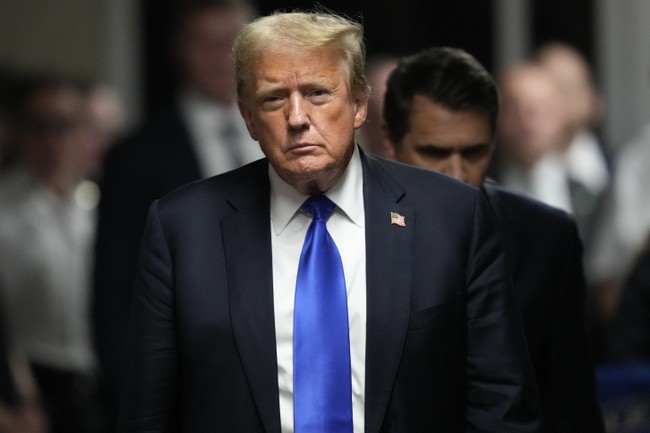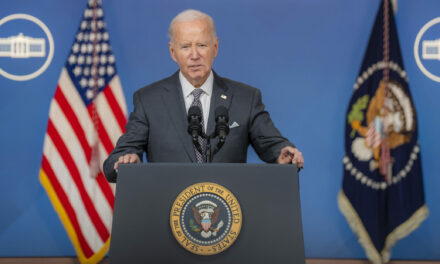We support our Publishers and Content Creators. You can view this story on their website by CLICKING HERE.

Disappointing for Donald Trump, surely, but not unexpected either. Trump’s lawyers applied for a stay to both the Supreme Court and to New York’s highest court to stop the sentencing hearing scheduled by Judge Juan Merchan for tomorrow morning. Had Trump’s team expected success from the appeal within the state system, they wouldn’t have bothered with the more extraordinary appeal to the Supreme Court.
Advertisement
The New York Court of Appeals, the highest court in the state, has denied President-elect Donald Trump’s request to halt his sentencing Friday in his criminal hush money case.
Trump on Wednesday launched an eleventh-hour request to New York’s highest court to pause the hush money case, on the same day that he also asked the U.S. Supreme Court to halt his sentencing.
The court didn’t issue a ruling or statement in denying the appeal, just an order declining to grant a hearing. That’s as high as Trump can take it in the state judicial system, but that does help unlock the issue now for the Supreme Court. Under normal circumstances, the latter won’t take up an issue from a state court until all of the appeal options in the state have been exhausted.
By declining to grant a hearing, the Court of Appeals made this issue ripe for the US Supreme Court. That doesn’t mean that SCOTUS will act on this appeal, but it does remove the extraordinary circumstances that the court would otherwise have to explain. They may have anticipated that yesterday when they required prosecutors to respond to Trump’s application for intervention, or perhaps they are concerned that Merchan ignored their earlier ruling in Trump v US about the use of official acts in cases of prosecutions of presidents.
Alvin Bragg’s office submitted their response to the Supreme Court this morning as well, as ABC News goes on to detail. They not only insist that Trump is not eligible yet for immunity but also insist that his “character” is at issue here:
Advertisement
Prosecutors in their filing Thursday signaled confidence in the strength of their case, claiming that the jury saw “overwhelming” evidence of Trump’s guilt and criticizing the president-elect’s contemptuous conduct in court.
“And notwithstanding defendant’s past and upcoming service as President, his history, character, and condition — and especially his open disregard for the justice system — do not support dismissal,” the filing said.
Perhaps this is a kind of legal boilerplate used in such cases, but it steps dangerously close to an admission to Trump’s allegations that this is a personal and political vendetta rather than justice. The “open disregard” to which they refer is Trump’s insistence that the Bragg indictment was illegitimate on its face, a point that New York’s rules has not allowed him to argue through a normal appeal. The conduct of the trial, especially in Merchan’s allowing clearly immunized official acts to be part of the case against Trump, is in large part why Trump has ‘disregarded’ both Bragg and Merchan as well as the proceedings.
This sounds almost explicitly like a plea to allow Merchan to punish Trump for who he is, rather than for the interests of justice as normally considered.
Also this morning, the Supreme Court received an amicus brief from former AG Edwin Meese and con-law specialist Steven Calabresi. They argue that even if there is a legit interest in justice over an issue of 34 ledger entries, the interests of the nation far outweigh those at this point:
OLC holds that the Constitution forbids a sitting President being indicted or prosecuted, granting him unique immunity. This presidential immunity arises from the separation of powers at the federal level, and exists at the state level because of federalism and comity rooted in the Supremacy Clause. It extends to all stages of criminal proceedings, including sentencing and appeals. Criminal prosecutions are of a different species from civil litigation because of the greater burden they impose. Although a particular prosecution might not burden a President to an unconstitutional extent, the lack of certainty ex ante on that score necessitates a categorical rule against indictment and prosecution. The scope and gravity of a President’s duties are such that the practical demands of the presidency are all-consuming, whether as Commander in Chief or Chief Executive. And the risk that the stigma attending criminal proceedings would impair the President’s performance both at home and abroad is intolerable under the Constitution. Given that, it is unsurprising that OLC recently concluded that the Constitution does not even permit a prosecution to be held in abeyance during a President’s term in office. Presidential immunity extends to the outer perimeter of his responsibilities, so a categorical rule best captures the core of immunity that its holder need not answer to a court.
Even if the Constitution did not definitively require dismissal, prudence counsels it. While a state has a legitimate interests in each criminal prosecution to vindicate its sovereign right to define societal harms and pursue violators, the United States has a compelling public interest in the sitting President’s devoting his full attention to his duties, unburdened and undistracted by ongoing prosecutions. President Trump is already engaged in official duties as President-Elect and besmirching his standing as he performs those duties would be noxious to the Constitution. No President can be impaired in that fashion by a county prosecutor. Even if the charges were well-founded and the continued prosecution consistent with the Constitution, New York’s interests in any single criminal prosecution is dwarfed by the interests of the Nation as a whole.
Advertisement
If prosecutors expect the Supreme Court to weigh Trump’s “character” as an argument to allow this to proceed, then the court can certainly weigh the balance of interests involved, too. And the balance of interests absurdly run against the lawfare interests of Bragg and Merchan, especially in the way that Bragg structured this case from the beginning.
Let’s hope the Supreme Court sees it that way.

 Conservative
Conservative  Search
Search Trending
Trending Current News
Current News 



